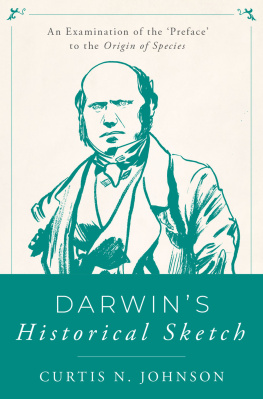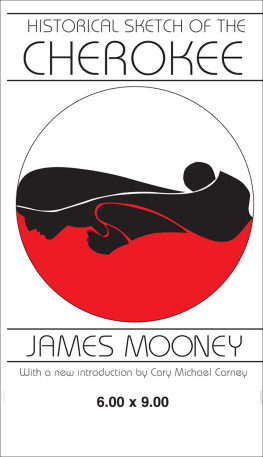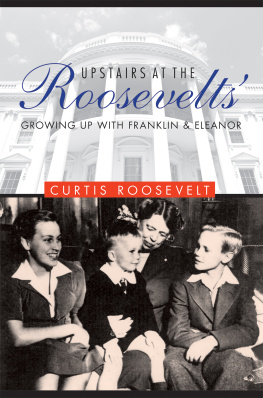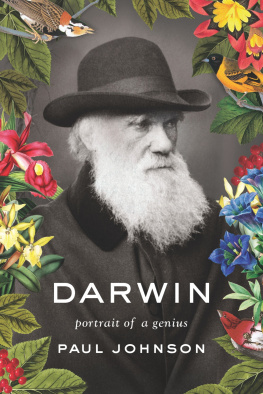Johnson Curtis N. - Darwins Historical Sketch
Here you can read online Johnson Curtis N. - Darwins Historical Sketch full text of the book (entire story) in english for free. Download pdf and epub, get meaning, cover and reviews about this ebook. year: 2019, publisher: OxfordUP, genre: Science. Description of the work, (preface) as well as reviews are available. Best literature library LitArk.com created for fans of good reading and offers a wide selection of genres:
Romance novel
Science fiction
Adventure
Detective
Science
History
Home and family
Prose
Art
Politics
Computer
Non-fiction
Religion
Business
Children
Humor
Choose a favorite category and find really read worthwhile books. Enjoy immersion in the world of imagination, feel the emotions of the characters or learn something new for yourself, make an fascinating discovery.
- Book:Darwins Historical Sketch
- Author:
- Publisher:OxfordUP
- Genre:
- Year:2019
- Rating:3 / 5
- Favourites:Add to favourites
- Your mark:
- 60
- 1
- 2
- 3
- 4
- 5
Darwins Historical Sketch: summary, description and annotation
We offer to read an annotation, description, summary or preface (depends on what the author of the book "Darwins Historical Sketch" wrote himself). If you haven't found the necessary information about the book — write in the comments, we will try to find it.
Darwins Historical Sketch — read online for free the complete book (whole text) full work
Below is the text of the book, divided by pages. System saving the place of the last page read, allows you to conveniently read the book "Darwins Historical Sketch" online for free, without having to search again every time where you left off. Put a bookmark, and you can go to the page where you finished reading at any time.
Font size:
Interval:
Bookmark:


Oxford University Press is a department of the University of Oxford. It furthers the Universitys objective of excellence in research, scholarship, and education by publishing worldwide. Oxford is a registered trade mark of Oxford University Press in the UK and certain other countries.
Published in the United States of America by Oxford University Press
198 Madison Avenue, New York, NY 10016, United States of America.
Oxford University Press 2020
All rights reserved. No part of this publication may be reproduced, stored in a retrieval system, or transmitted, in any form or by any means, without the prior permission in writing of Oxford University Press, or as expressly permitted by law, by license, or under terms agreed with the appropriate reproduction rights organization. Inquiries concerning reproduction outside the scope of the above should be sent to the Rights Department, Oxford University Press, at the address above.
You must not circulate this work in any other form and you must impose this same condition on any acquirer.
CIP data is on file at the Library of Congress
ISBN 9780190882938
I dedicate this work to Albert Johnson, my father, who while alive and also now that he is deceased has inspired my love for Darwin and evolutionary biology. He guided me to Darwin and showed me by instruction and example how to think like a biologist, as far as he could.
When Darwins Origin of Species first appeared in published form, in late November 1859, it consisted of a brief (six-page) introduction and 14 additional chapters, running to almost 500 pages. This was the first time his full-fledged theory in all its detail appeared in print, with supporting documentation and evidence. It was an immediate sensation, establishing Darwin as a scientific superstar and sparking off debates of sundry kinds that continue unabated to this day.
One debate that has attracted more attention than most over the years concerns Darwins sources for his theory. Few people dispute that Darwins theory, considered in full, was his own immaculate brainchild, his own original discovery. Most people also agree, however, that the theory did not grow out of thin air. Darwin was engaged from an early time in his scientific career in ongoing discussions with many other scientists and naturalists. Some of these conversations were directface-to-face meetings or personal lettersand others were discussions he had with himself, so to speak: his marginal notes to books he read, his own personal notebooks, a diary, and other forms of self-conversing. From all of this material we see clearly that Darwins thoughts were influenced and shaped by the views of many others. In that sense, he was not working alone. He was contributing to a broad culture of scientific discourse, drawing as necessary from others, adding his own insights where appropriate.
Yet missing from the first edition of the Origin was a systematic register of his intellectual debts. The book had, as we would say today, no acknowledgments page. That was a deficiency that was quickly brought to Darwins attention almost as soon as the book hit the bookstores. Darwin knew he would need to take steps immediately to remedy the deficiency. To that end, he assembledsomewhat in hastea Preface to Origin, making sure future editions would include it at the beginning of the volume. This document, 11 pages in all, is where Darwin set out the contributions of his predecessors to the species problem, whether they had actually influenced his own thinking or not.
In short time, this brief Preface came to be called, in shorthand, the Historical Sketch. It is the first part of Darwins magnum opus that any modern reader of Origin will come across. Because of its brevity, perhaps, it has not attracted a great deal of attention, certainly among casual readers who just want to read the magical words of the Origin itself, but also among Darwin scholars. In it, Darwin cited some 35 authorities by the final edition. In the compass of 11 pages, that does not allow much room for any single author. True to expectation, most entries give one, perhaps two, short paragraphs to each authority. Yet, these are the 35 Darwin himself identified as most deserving of inclusion in identifying his predecessors, and in indicating how they contributed to the solution of the mystery of mysteries, the origin of new species on this planet, his own special topic.
The work presented here takes on the Sketch, with the attention a major contribution in the history of science deserves. People may quarrel with some of Darwins choices about whom to include in or exclude from the Sketch, or even with the significance of the Sketch itself as an important historical document. And in truth, some of Darwins choices do seem curious. Several authorities one might have expected to be mentioned in the Sketch are not in itfigures such as Charles Lyell, Benjamin Carpenter, Edward Blyth, F. Cuvier, T.R. Malthus, to name only a few. Other figures who are included in the SketchHenry Freke, C.S. Rafinesque, B. de Maillet, and othersare so obscure, and were even in Darwins day, or so seemingly irrelevant to the project Darwin had set for himself, that they have been mostly forgotten by science. Many of them hang on in the scientific literature for no other reason than that Darwin included them in the Sketch. Moreover, the Sketch in its entirety is so brief that one might conclude Darwin did not take it too seriously himself. We have been advised by a number of more recent authorities to look elsewhere for Darwins true predecessors.
To overlook the Sketch, however, would be a mistake, if one is to take the full measure of Darwins contribution to biological thought. Yes, it raises a number of puzzles. But the attempt to resolve them is itself an enterprise in scientific discovery. As is true with many of Darwins private reflections, many of which have been made available to a general reading audience only in the last few decades, the Sketch helps us fill in some blanks about the genesis of Darwins ideas. Above all, it helps us see how Darwin positioned his own theory in the broader context of contemporary scientific thought. It thus sheds important light on what Darwin regarded as original in his theory, and what he regarded as derivative. It gives us insights into the aspects of his theory he found to be most important and helps us to discriminate more sharply between essential features and ancillary ones. It gives us a unique picture of Darwins reading habits, how he recorded his encounters with the scientific literature of his day, and his method of retrieving information for later use long after his earliest contact with it. If Darwinism is whatever Darwin thought it was, one cannot do much better than by beginning with a look at his Sketch.
My intellectual debts in developing this work are recorded mainly in the footnotes and bibliography. Part of the enjoyment has been tracking down Darwins often scanty references to the literature he drew upon. Librarians at Cambridge University Library, the American Museum of Natural History, Lewis & Clark College Library, and the various institutions with which they consulted, have been generous with time and information. Much of this work could not have been done without their unfailing assistance. I have been encouraged in my writing by David Kohn, Jon Hodge, Michael Ghiselin, J. David Archibald, David Depew, John Beatty, Albert Johnson, Nick Smith, William Rottschafer, Kip Ault, and the members of the Political Theory Reading Group in Portland, Oregon, with special mention of the late Chana Cox.
Font size:
Interval:
Bookmark:
Similar books «Darwins Historical Sketch»
Look at similar books to Darwins Historical Sketch. We have selected literature similar in name and meaning in the hope of providing readers with more options to find new, interesting, not yet read works.
Discussion, reviews of the book Darwins Historical Sketch and just readers' own opinions. Leave your comments, write what you think about the work, its meaning or the main characters. Specify what exactly you liked and what you didn't like, and why you think so.








